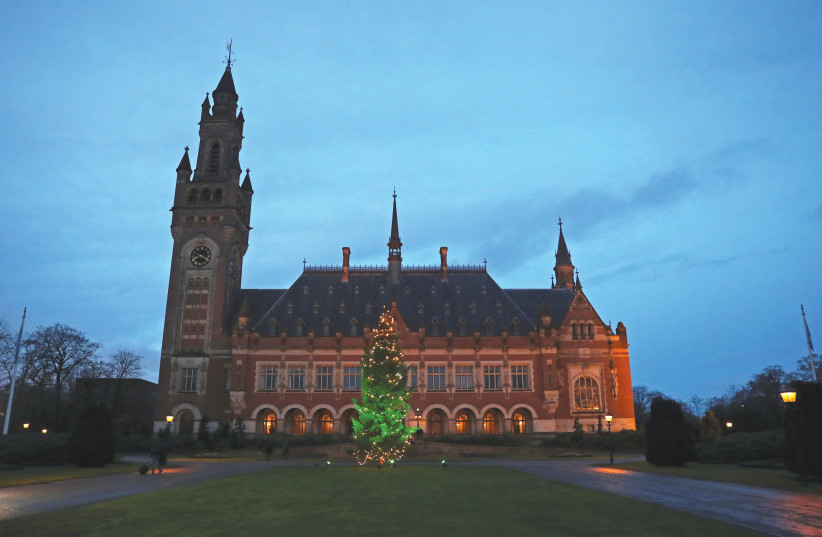THE HAGUE, the Netherlands – For the first time since its establishment, the State of Israel is facing accusations at the International Court of Justice (ICJ) in The Hague, blaming it for genocide against Palestinians in its Gaza offensive. The hearings will take place on Thursday and Friday.
South Africa and Israel exchanged allegations on the eve of hearings at the top UN court, which will hear South Africa’s claims. The politically charged hearings will deal exclusively with South Africa’s request for emergency measures ordering Israel to suspend its military actions in Gaza while the court hears the merits of the case – a process that could take years.
More than a hundred journalists are expected at the ICJ for the hearings, even though the sessions will be aired live, forcing the court to open extra press rooms, a situation its administrators have rarely witnessed. Dozens of TV crews are also expected to cover the march organized by Jewish and Christian groups outside the building at the time of the hearing on Thursday in support of Israel. Pro-Palestinians are also expected to demonstrate against Israel.
Israel is a member of the ICJ and is also a signatory to the 1948 Genocide Convention. As such, it recognizes in principle the jurisdiction of the court.
The South African complaint against Israel is based on two sets of evidence: the extent of the devastation in Gaza, including the large number of dead and the vast destruction caused by Israeli bombardments; and quotes from Israeli officials that allegedly show an intended policy of massacre against Palestinian civilians.

Israeli experts expect an acquittal, but caution that nothing is certain
While Israeli experts on international law believe that by the end of the process, Israel will not be found guilty of genocide, they also admit that nothing is certain. Concurrently, Israeli diplomats warn that any decision by the court against Israel could significantly damage international support for the battle to eliminate Hamas. In particular, such a ruling would pressure the United States to take a tougher stance vis-à-vis Israel on continuing its military operations in the southern part of the Gaza Strip.
The 84-page-long charge submitted by South Africa to the ICJ is divided into two parts. The first part is the allegation that Israel is carrying out an intended genocide against Palestinians in Gaza. Deliberations of the court on that issue could take several months or perhaps even several years.
South Africa is also requesting from the court an interim, rapid measure, ordering Israel to immediately stop its military campaign in Gaza. The second request does not depend on the first and could be granted within a matter of days, challenging Israel’s refusal so far to requests by the Biden administration to limit its military operations and bombardments.
The ICJ has scheduled two hearings. The first session is expected to begin at 10 a.m. Thursday morning. South Africa will have the floor for about three hours to present its case against Israel.
Leading the South African legal team is Prof. John Dugard, who chaired a United Nations Commission of Human Rights inquiry committee in 2000 after the Second Intifada broke out. He also wrote extensively on the Palestinian issue, had compared Israel’s regime to the Apartheid, and had called for an arms embargo on Israel.
Facing him will be British law professor Malcolm Shaw, who will have the floor for three hours on Friday. Shaw is considered a world-leading expert on international law, has advised different governments and international organizations on issues related to human rights, and has appeared before the ICJ in the past. Like Dugard, he is expected to deliver a prepared speech.
The fixed 15-justice panel of the ICJ will be joined by two more judges, representing each of the sides. South Africa picked for the task former deputy chief justice Dikgang Moseneke. Israel chose former Supreme Court president and Holocaust survivor Aharon Barak. While the appointment of the two judges will not weigh number-wise on the balance of power within the panel, each of the sides hopes for the opinion of their elected judge to influence the other justices.
Hearings of that sort do not resemble regular court sessions. ICJ judges rarely interrupt speeches with questions, and no witnesses are invited to appear before the court. That could happen at a later stage after a decision is taken on the South African request for an interim order against the IDF, when the court starts deliberating the bigger question of whether Israel is guilty of genocide.
Pretoria submitted its petition to the ICJ on December 29, leaving Israel with little time to prepare for the procedure. Still, the Israeli Foreign and Justice ministries are present in the Hague in large forces. The legal team is accompanied by Foreign Ministry spokeswoman Lior Haiat; David Saranga, head of the ministry’s digital department; and other communications experts.
Also in the Hague is a delegation of families of hostages held in Gaza, including Moshe Leimberg, brother-in-law of Fernando Marma and Louis Har; Danny Miran, father of Omri Miran; Ayala Yahalomi, sister of Ohad Yahalomi; Yuval Dazig, son of Alex Danzig; and Michael Levy, brother of Or Levy.
They will hold a press conference in The Hague on Thursday afternoon in an effort to remind the world what the war against Hamas is really about.
